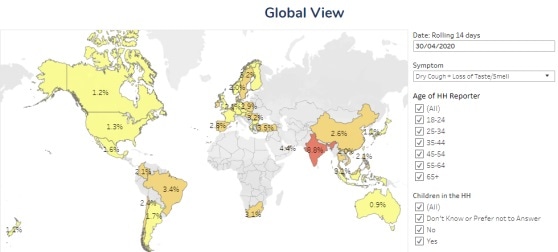The world’s largest first-party data and insights platform, Dynata, is using its scale and reach to assist organizations around the world with the monitoring and tracking of COVID-19. As part of its ‘Data for Good’ program, Dynata’s Global COVID-19 Symptom Map collects approximately 350,000 daily responses from people self-reporting symptoms associated with COVID-19. Those responses can then be visualized down to the local level over a two-week period (beginning 22nd March). The data can be utilized by researchers, governments, media organizations, healthcare and local authorities (and more) to help society make decisions about how to respond to the pandemic. They have made the data open and accessible for free to the public, available here.

Dynata COVID-19 Symptom Map: International prevalence of dry cough plus loss of taste or smell symptoms.
Dynata is doing its part in this global pandemic by collecting and sharing the largest possible amount of self-reported COVID-19 symptoms data, using a “wisdom of the crowds” approach. Its aim is to assist governments in their decisions about relaxing social distancing rules, reopening businesses, schools, and other community resources, as well as in identifying potential hot spots of infection before their local healthcare systems are overwhelmed. Dynata also hopes that media and other public information sources can help raise awareness of the availability of this data, so that organizations and individuals on the front lines of this crisis can use it in their efforts.
Since launching the Symptom Tracker on 22nd March, Dynata has collected over 12 million responses (as of 30th April) from its database of 62 million global panelists by asking people visiting its survey platform a simple question: “Are you or anyone in your household experiencing symptoms associated with COVID-19?”. Dynata’s tracker uniquely monitors multiple symptoms that are specific indicators of a COVID-19, as well as other demographic data, such as whether the respondent has children, their age, educational level and more.
The dataset is already being used by researchers from Harvard Kennedy School, whose team comments:
The high frequency nature, geographic detail coupled with a “wisdom of crowds” approach of the Dynata Global Symptom map fulfills a definite void until there is widespread testing. The information Dynata is providing is very complementary to other efforts to track the epidemic and can be used for real societal benefit. For example, our team is using the map to assess health inequality and policy effectiveness. We are combining Dynata’s weekly and daily trackers with our own designs surveys (run through the Dynata platform) to study the trade-offs between civil liberties, economic losses, and public health in many countries.”
We have more than 62 million panelists across the globe, most of whom are likely dealing with the COVID-19 pandemic in some way. Typically, we leverage this scale to help brands understand the attitudes, opinions, and trends driving consumer and B2B purchase decisions or politics. Now we can use our scale in this unprecedented and extraordinary time to identify locations that could emerge as the next hot spots of COVID-19 outbreak, potentially providing healthcare workers and governments a better chance to prepare and respond to the continued pandemic threat."
Gary S. Laben, CEO of Dynata